The handover is complete, his feet are under the desk, and now the fun starts for David Humphreys.
It's been just over ten days since Humphreys officially took charge as the IRFU’s performance director.
The former Ireland and Ulster out-half has spent the last three months shadowing outgoing performance lead David Nucifora, who will focus exclusively on the Olympic Sevens preparation for the rest of the summer before returning to the southern hemisphere, where he will take up an advisory role with Rugby Australia.
With Nucifora having led the high performance side of the IRFU for the past decade, it will be fascinating to see what particular spin Humphreys puts into the role.
As a former Irish international and a player and director of rugby, there will arguably be greater pressure and scrutiny on his shoulders than Nucifora had as an outsider to the system.
As Humphreys reminded us at the Aviva Stadium when he spoke to the media for the first time in his new role, he is an outsider, of sorts. He’s ten years removed from the Irish rugby system, having spent time working with Gloucester and Georgia, and more recently as performance director with the English Cricket Board.
His first public briefing came as the IRFU launched their new strategic plan for 2024 to 2028. Sitting alongside chief executive Kevin Potts and strategy and projects manager Kate Binchy, Humphreys fielded the majority of questions across a 50-minute session.
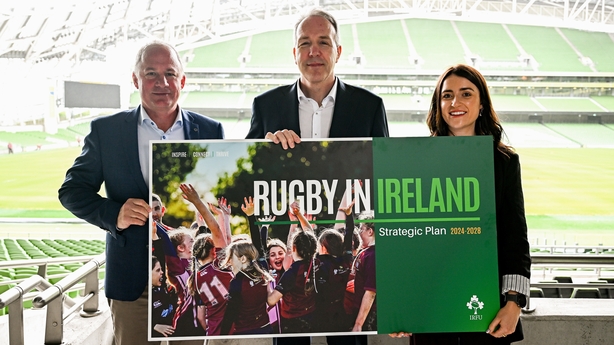
The questions and answers spanned a wide range of issues in Irish rugby; central contracts, expanding the production line beyond private schools, evening out the backlog of talent, the role of the club game, coaching development, as well as the areas of growth in the women’s game.
The backlog of talent at Leinster has been the hot issue in recent weeks, particularly at out-half, where Ross and Harry Byrne, Ciarán Frawley and Sam Prendergast appear to be negotiating a time-share of the 10 shirt next season.
Meanwhile, Connacht may have to bring in a non-Irish qualified out-half to cover for the injured JJ Hanrahan, while Ulster were scrambling around for an option in that position before drafting in Irish-qualified Aidan Morgan from the Hurricanes in New Zealand.
Connacht have tried to convince Leinster into a loan deal for one of their surplus out-halves, but that now looks unlikely to happen.
Humphreys insists no players will be forced into swapping provinces by the union.
"I will never move a player against their will, we will never move a player under contract against their will," Humphreys said.
However, the performance director added that when it comes to international selection, he wants to encourage ambition.
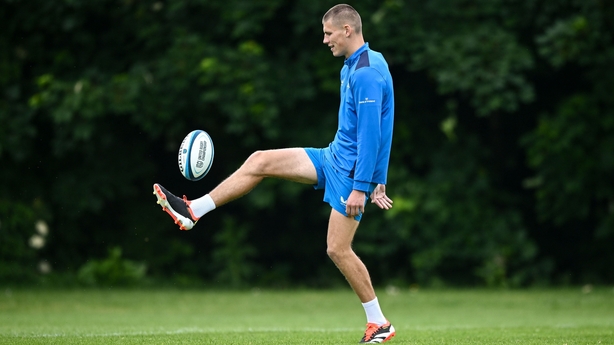
"There will be times when we've got to get players game time. The game is the best coach. Without getting into specifics, we have to sit down with the province and look at what's best for the national team and the province.
"Where you have a player who we believe could be performing out here, sitting in third, fourth or fifth [choice] in the province and not getting the game time that they need to develop, that's sending a strong message about that player's ambition to Andy Farrell and the people who pick the team.
"We want players who are competitive, who are going to give it everything they have to play for Ireland. If they choose not to do that for whatever reason, so be it."
Expanding the pool of players available to Ireland head coach Farrell remains a high priority, evidenced by the announcement of another Emerging Ireland tour of South Africa later this year.
The previous tour in September of 2022 was met with frustration by provincial coaches, who lost players early in the URC campaign.
There will once again be a clash with URC games when Simon Easterby’s squad travel for their three-game tour in the autumn of this year, but Humphreys says the early announcement of their plans means it will be less invasive.
"I think the tour happened at quite short notice which caused some challenges for preparation at the start of the season.
"All the provinces want to get off to a good start, so by announcing it last week we've gone very early.
"They know the coaching team, we'll give them a broad indication of the group of players we're looking at so they'll know what they have to do to approach weeks one, two, three and four of the URC."
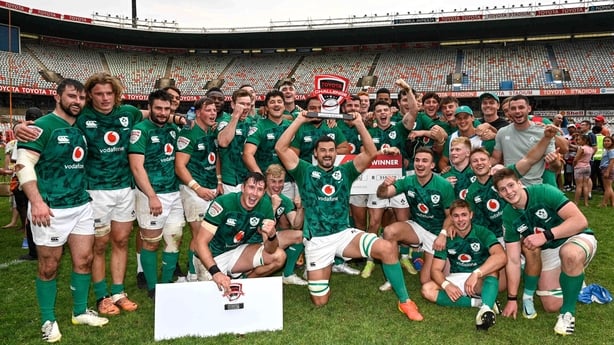
Humphreys added that representative sides like Emerging Ireland and Ireland 'A’ are something they see real merit in.
"It's certainly got a value, the one piece that's come out of Emerging Ireland is the huge value that the senior coaches have had in terms of getting a really good insight into how the players not just play, because they can see that in the video or by turning up at the game, but by how they approach and prepare for training, their analysis.
"It works both ways, the players then see what's required and what the expectation is from those senior coaches.
"So, it has certainly benefited that group of players and when you look at the World Cup and some of the impact those young players have had, it certainly served its purpose.
"I do see a real value in 'A' team rugby, just being that step up and also taking certain players out of a system where they're very comfortable, and challenging them by coaching, by who they're playing against," he added.
Humphreys, and chief executive Kevin Potts, also gave further details on the upcoming changes to the central contract model of the IRFU, which will see provinces contribute up to 30% of the wages of their players who are on national deals.
The move is designed to give greater parity across the four provinces, with the current high concentration of Leinster players on central deals, in comparison to Munster, Ulster and Connacht, affording them a better opportunity to retain their squad year on year.
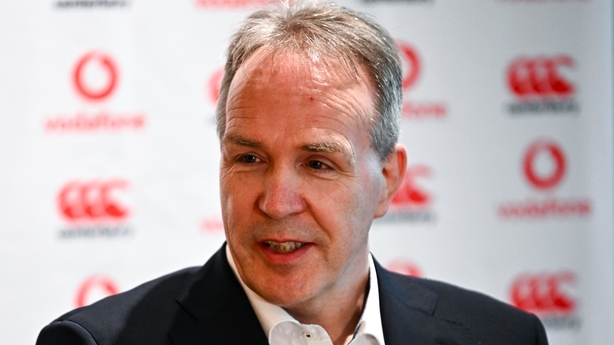
"It’s one of those emotive issues," Potts (above) said.
"What we now have, is if you have a national player, you contribute 30% [of their salary] and that generates funds from the province into whom those players are with, and that has already been reallocated across other provinces in terms of their elite programmes for next year.
"It was something we were looking at from the beginning of last year, we knew it was an issue.
"It will enable David [Humphreys] to invest additional resources in those provinces that maybe don't have the resources that a province like Leinster have. So, it hopefully will have a positive impact.
"Fundamentally, it's really important to Irish rugby that we have four provinces that are competing, four provinces that are generating players that are coming through to the national team.
"There are three provinces trying really hard to do that and we need to help them any way that we can. So, the 30% provides resources for us to do that."
David Humphreys also gave updates on a variety of issues in the Irish game.
Expanding the production line
The one message that I have been talking to our team about is there is a lot of talk about Leinster, the fact that they are ‘overproducing’ players. In the high performance system you can’t overproduce players.
We want all our provinces producing more and more players to make Andy Farrell’s decision-making and the four provincial head coaches' decision-making much more difficult. A smaller group of players doesn’t pose those challenges.
But we are very clear that we are a sport that has to continue to grow. We are a sport that can't rely on the private schools. They have always been central to producing players for Irish rugby long before the game went professional. Since going professional, they have been an increasingly important part.
We have to have our own system here producing not just more but better players across the system. We have to be creative where we go and find players, whether that is from other sports, which we will continue to do and try and do it better.
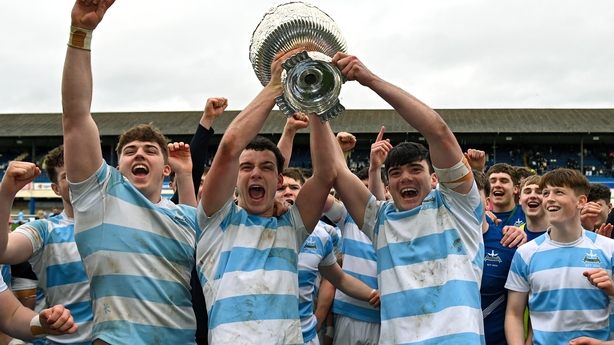
Provincial A competitions
Over the last month we looked at having six games for the 'A' teams, we want to make it much more formal than it's been, so we don't have teams pulling out at the last minute or players coming in from club rugby at the last minute, disturbing what club rugby looks like.
We will have a structure in place, it's just working out where that sits especially with Emerging Ireland coming up.
If we can get six weekends, we'll for sure be bringing that formalised piece and have the province taking it seriously.
Ulster Rugby’s future
I think there's been a huge upturn in the mood around Ulster.
I think there's been a huge upturn, even in the result against Leinster, the way they played and the energy they brought. Richie's got a real quality in terms of, not just his coaching ability, but his ability to get the best out of players.
They're going to have to go through an evolution. Munster did it a few years ago and did it very well and look where they've got to now. That's part of what Richie's going in to do. He's very good and brining young players through.
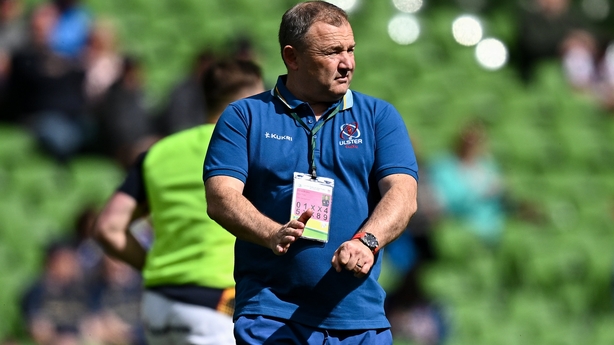
Women’s rugby
I am absolutely sure that over the course of the next two or three years you will see a very, not quick, but a well-structured and organised evolution of the Celtic Challenge to ensure that as we get more girls and women coming through the professional game they have an opportunity to perform.
Closing that performance gap which there is at the moment between where women are playing now compared to where England and France are playing [is important].
The club game
I do see a very, very strong value in the club game and giving players the right level of game-time.
The game is the best coach, we can talk all the time about our best systems but we've got to see players play.
I very, very much see a strong mix of All Ireland League, 'A' team rugby and provincial rugby in preparing players to play in a green jersey.
That will change year to year depending on the demands of the group of players that we have in place, as part of that performance integration between national and provincial - that sort of vertical piece - what we're trying to work out is what does the performance part actually include?
We're starting to look at Schools Cup teams, All-Ireland League Division 1 teams, because I think we'd all agree the quality of AIL Division 1 rugby this year has been very, very good and there's certainly a good preparation for good players to play U20s and university, to play All-Ireland League 1 into provincial [level].
Listen to the RTÉ Rugby podcast on Apple Podcasts, Spotify or wherever you get your podcasts.
Watch the URC semi-final, Bulls v Leinster, on Saturday from 2.30pm on RTÉ One and RTÉ Player,
Listen to live commentary of Bulls v Leinster, and Munster v Glasgow Warriors on Saturday Sport on RTÉ Radio 1, and follow a live blog on rte.ie/sport and the RTÉ News app.


